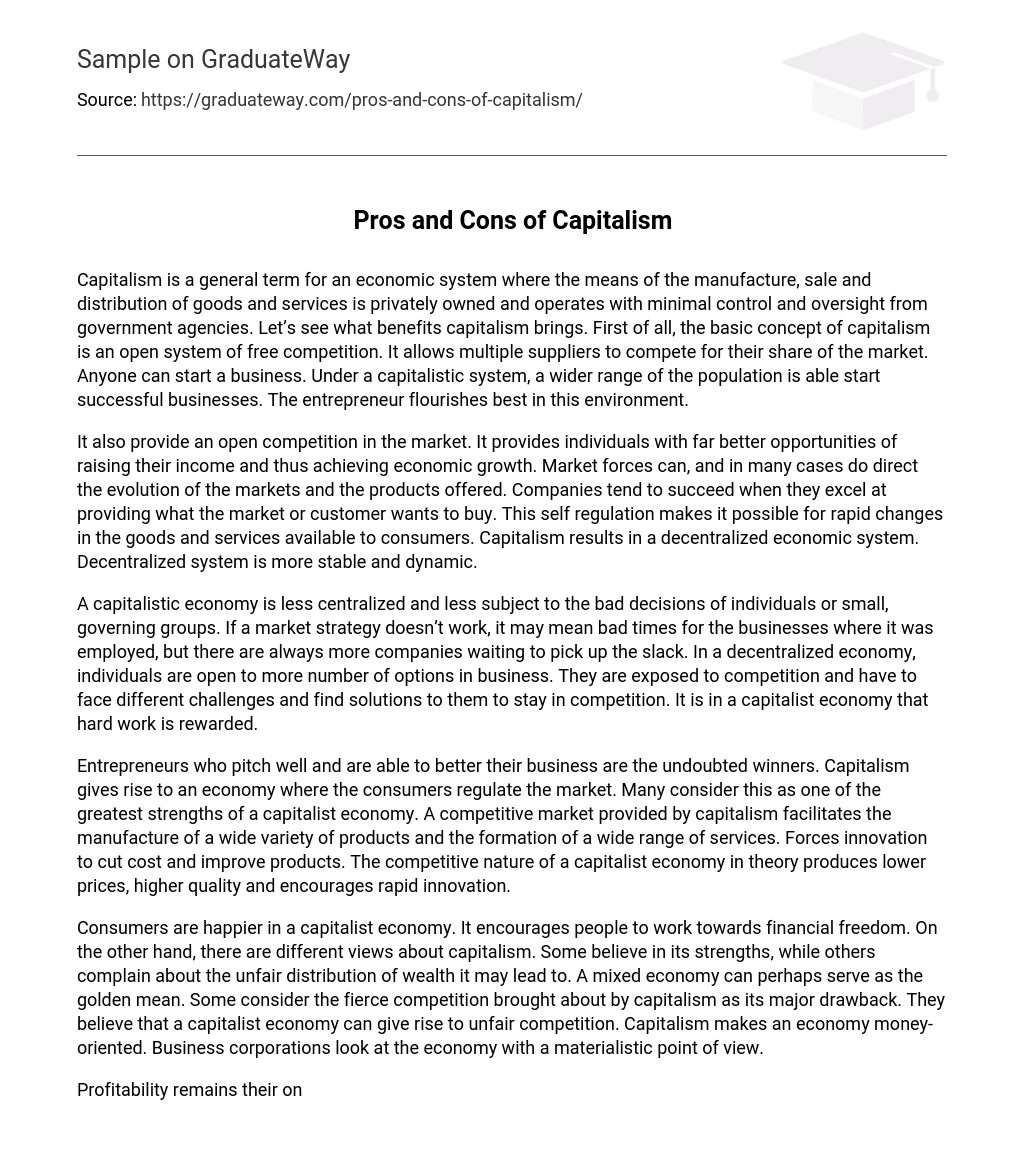Capitalism is an economic system characterized by privately owned means of manufacturing, selling, and distributing goods and services with minimal government oversight. It offers the advantage of a free competition system, allowing multiple suppliers to compete for market share. Additionally, it enables anyone to start a business and provides opportunities for a wider segment of the population to establish successful businesses. This setting fosters the thriving of the entrepreneurial spirit.
The open competition in the market offered by capitalism provides individuals with better opportunities to increase their income and achieve economic growth. Market forces play a role in directing the evolution of markets and the products on offer, leading to the success of companies that excel at meeting customer demands. This self-regulation allows for rapid changes in consumer goods and services. Ultimately, capitalism results in a decentralized economic system, which is both stable and dynamic.
A capitalistic economy is both less centralized and less susceptible to the poor decisions of individuals or small governing groups. If a certain market strategy fails, it may result in hardships for the businesses that implemented it; however, there are always other companies ready to step in and fill the void. In a decentralized economy, individuals have more opportunities for business and are subject to competition, requiring them to confront various challenges and devise solutions to remain competitive. It is within a capitalist economy that diligent effort is duly recognized and rewarded.
Entrepreneurs who can effectively present their ideas and enhance their businesses emerge as the clear winners. Capitalism fosters an economy where the market is regulated by consumers, making it one of the key advantages of a capitalist system. This competitive market, enabled by capitalism, allows for diverse product production and a broad array of services to be established. It also compels innovation to reduce expenses and improve product quality. The inherent competitive nature in a capitalist economy theoretically leads to lower prices, superior quality products, and encourages rapid innovation.
Consumers in a capitalist economy are more satisfied. Capitalism incentivizes individuals to strive for financial independence. However, there are varying opinions on capitalism. Some endorse its merits, while others criticize the potential for unequal wealth distribution. A mixed economy could possibly strike a balance. For those who see fierce competition as a major drawback of capitalism, it is believed that such an economic system can create an environment of unfair competition. Capitalism promotes a money-centric mentality within businesses, where the economy is viewed from a materialistic perspective.
The main focus of business giants is maximizing profitability, which often leads them to acquire smaller companies. Their concern for employment rights is primarily based on how they impact productivity. Additionally, capitalism tends to disregard social benefits and frequently overlooks externalities within a free market system. For instance, a profit-driven capitalist firm may disregard negative externalities like pollution that can negatively affect quality of life. Similarly, a free market economy does not adequately provide goods with positive externalities such as healthcare, public transport, and education.
In a capitalist society, government plays a crucial role in providing public goods and services to enhance its full potential. This is necessary because resource allocation can be inefficient. Capitalism is based on the legal right to private property and intergenerational wealth transfer, leading to inequality in wealth distribution. Supporters of capitalism claim that it is fair as individuals are rewarded based on their hard work. However, often wealth arises from inheritance or advantageous birth rather than individual merit.
Accordingly, capitalist society falls short in both achieving equality of outcome and equality of opportunity. Inequality leads to social division, particularly in highly unequal societies. Capitalism emphasizes the importance of individuals earning more, resulting in income and wealth inequality. Unfortunately, this perspective overlooks the diminishing marginal utility of wealth. For instance, a millionaire who receives an additional million experiences minimal economic welfare improvement. Conversely, using that same million for healthcare would yield a significantly larger increase in social welfare.
At lower levels of regulation, individual companies or groups can exploit the system, resulting in abusive practices such as unfair labor practices. The expenses incurred by businesses for employee wages are significant, and in order to counter workers’ demands for better pay, companies have employed different strategies, such as prohibiting unions. Additionally, some economists argue that capitalism may deplete Earth’s resources due to its need for continuous economic growth.
Although the recent increase in ecological awareness among consumers may be prompting some companies to improve their environmental impact, only a few have taken voluntary actions. The emergence of mega corporations is seen as a new kind of capitalist excess, aiming to eliminate competition that safeguards consumers from price exploitation. Instead of forming illegal alliances, these mega companies expand by acquiring or pushing out their competitors from the market.
Capitalism is often criticized for being dominated by a single, large supplier, which limits consumer choice to the products available at a fixed price. This economic system is also blamed for the significant wealth gap seen in many capitalistic countries. The top management of major corporations earn substantially more money than their employees, highlighting the disparity. The private ownership of capital allows firms to gain a monopoly in product and labor markets, allowing them to charge higher prices due to their dominant position.





